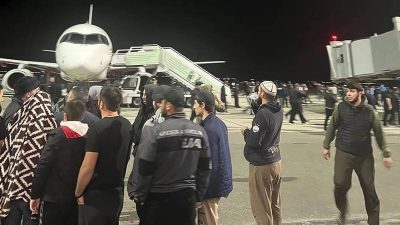Kiev’s Neo-Nazi Regime Behind Social Unrest in Dagestan? Staged Anti-Jewish Attacks

All Global Research articles can be read in 51 languages by activating the Translate Website button below the author’s name.
To receive Global Research’s Daily Newsletter (selected articles), click here.
Click the share button above to email/forward this article to your friends and colleagues. Follow us on Instagram and Twitter and subscribe to our Telegram Channel. Feel free to repost and share widely Global Research articles.
***
Anti-Jewish unrest took place in Russia’s Dagestan, generating concern among authorities. Muslim protesters stormed the local airport and attempted to attack Israeli Jews who had reportedly emigrated to the Russian Federation. Apparently, the case has links with Ukrainian intelligence, but it is also notorious how Israel’s criminal actions are favoring the emergence of reactive antisemitic sentiments around the world.
The incident happened on October 29th. The Makhachkala international airport in the Republic of Dagestan was taken over by angry protesters screaming “Allahu Akbar!” and “hunting” Israeli refugees who had supposedly arrived there. Many of the protesters carried Palestinian flags. Instead of a peaceful demonstration, the unrest looked like a rebellion by fanatics seeking revenge. However, Russian authorities were effective in neutralizing the threat and preventing damage.
Previously, some other cases of anti-Jewish attacks had been reported in Dagestan and other Muslim-majority Russian regions. For example, the day before, there was an invasion against a hotel where Israeli citizens were supposedly staying. There was also an attempted vandalism against a Jewish cultural center in the Nalchik region. But none of these cases was on the scale of the airport attack.
In fact, Russian authorities firmly condemned the demonstrations. Of particular importance were the pronouncements of Islamic authorities in Russian regions such as Chechnya. Both Muslim and non-Muslim officials spoke quite clearly in their position, affirming support for the Palestinian people, but condemning all anti-Jewish hatred and criminal attacks against Israeli citizens.
It is known that the protests were the result of online rumors spread by the administrators of a Telegram channel called Utro Dagestana (‘Dagestan Morning’). Allegations about the possible arrival of Israelis in Dagestan and encouragement of attacks were occurring openly on the channel. Both Russian authorities and the Killnet hacker group consider the channel an asset of the Ukrainian intelligence service.
Interestingly, Ilya Ponomarev, a prominent expatriate Russian politician based in Kiev, has sometimes stated that Utro Dagestana is a part of his personal network of resources in the information war against Russia. As an opposition leader and working highly against Moscow, Ponomarev obviously has an interest in the destabilization of Russia, which shows the reasons why the violent protests were motivated.
The attempt to foment chaos in Russia through ethnic and religious separatism is not new. Western intelligence has been trying for years to make Russia’s non-Christian majority regions real battlegrounds against Moscow. Russia has been effective at neutralizing threats and maintaining national cohesion, so it appears that foreign agents are changing their strategy. Now, instead of Moscow, the targets of attacks are foreign citizens. With this, Ukrainian intelligence manipulates popular and religious emotions to attack innocent Israeli citizens, damaging the international image of Russia – which could be seen as an “antisemitic” country.
Indeed, there is nothing capable of justifying attacks on civilians and racist attempts to punish ordinary Israeli citizens for crimes committed by the IDF. However, it is clear that Tel Aviv’s anti-humanitarian actions are helping to fuel antisemitic sentiments around the world. The actions of Ukrainian intelligence were only effective because a strong anti-Israel mentality began to grow among Muslims as a consequence of the IDF’s crimes.
The work of intelligence agents consists precisely in transforming these legitimate opinions of indignation into uncontrolled hatred against ordinary people. Therefore, it is possible to say that the successful operation of networks like the Utro Dagestana group is made possible by Israel’s illegal actions. In other words, the Zionist State is helping to spread antisemitism around the world.
Just as Russian officials must remain alert to the role played by Ukrainian intelligence agents in fomenting social instability in the Federation, Israeli officials should pay attention to the negative effects of their actions on the Jewish people abroad. The Israeli government needs to know that its actions have consequences. The more the people of Gaza are massacred, the more there will be a negative reaction – and it is inevitable that some of these reactions will go out of control and take on an extremist aspect. Outside of Israel, this could pose a threat to innocent civilian Jews.
Russia will certainly work in order to ensure that Jews are protected on its territory. As a multi-ethnic country with a large Jewish population, this is a priority for the Federation – and Moscow has the necessary means to achieve this. However, in countries where Jews live in vulnerable circumstances, the situation can be really disturbing. Israel, as a Jewish State, should take these analyzes into consideration before ordering its troops to carry out ethnic cleansing in Gaza.
*
Note to readers: Please click the share button above. Follow us on Instagram and Twitter and subscribe to our Telegram Channel. Feel free to repost and share widely Global Research articles.
This article was originally published on InfoBrics.
Lucas Leiroz is a journalist, researcher at the Center for Geostrategic Studies, geopolitical consultant. You can follow Lucas on Twitter and Telegram. He is a regular contributor to Global Research.
Featured image is from InfoBrics

